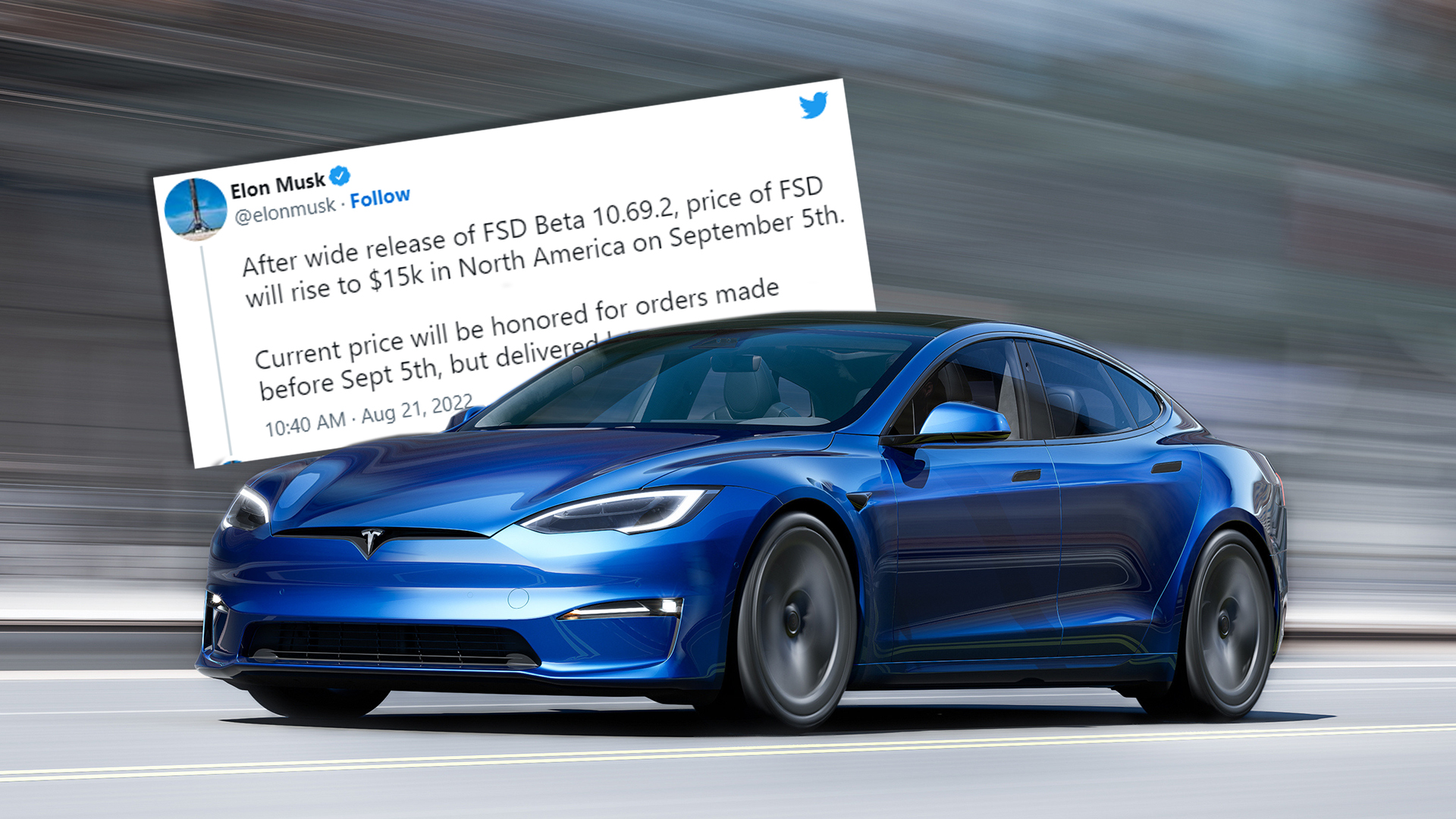

Electric automaker Tesla will increase the price of its Full Self-Driving (but not really) Beta by $3,000 beginning next month. This increase will bring the add-on feature to its highest ever cost, an astonishing $15,000.
Tesla CEO Elon Musk made the announcement on Twitter, which he may soon own, and encouraged owners to quickly upgrade via the Tesla app if they want to lock in FSD’s current price of $12,000 ahead of the hike. He did not mention if Tesla’s $199 per month FSD Beta subscription would increase, or if it would stay at its current pricing. For comparison, it would take more than six years to reach parity with FSD Beta’s new $15,000 price tag.
However, the newly announced price—which equates to roughly a third of the cost of the average brand-new car—has some Tesla fans questioning if the move is really worth the exorbitant price tag.
Some are complaining that the value simply isn’t there in the software’s current form, while others slam Tesla for not allowing the feature to be linked to their Tesla account, but rather locked to a vehicle (essentially validating Musk’s vision of a Tesla vehicle being an “appreciating asset” thanks to its partial-autonomation software). And there are also customers who refuse to purchase the software simply because they feel that Tesla isn’t keeping up in the luxury vehicle market due to its lack of premium features compared to competitors.
An increase in FSD’s price should come as little surprise to many. During Tesla’s second quarterly investor call earlier this year, Musk claimed that the existing $12,000 price tag is “ridiculously cheap,” given the value that it is supposedly poised to offer consumers in the future. In fact, Musk has previously claimed that the unrealized worth of FSD could be in excess of $100,000.
“The value of FSD is extremely high and not well understood by most people,” said Musk during Tesla’s second quarterly investor call of 2022. “It is basically currently ridiculously cheap, assuming FSD materializes, which it will.”
This is the seventh time in less than four years that Tesla has increased the price of its Full Self-Driving software. In 2018, the software was offered as a $3,000 add-on for customers who already had Tesla’s $5,000 Enhanced Auto Pilot package. The software was later made a standalone purchase. Determining the actual cost of the full Tesla autonomy stack is rather difficult when factoring in the date of purchase, price of the vehicle, and which features were even offered at the time of purchase—but the point is: $15,000 is five times the price of FSD when it first launched.
Historically, Tesla has failed to deliver on its promises of autonomy in a timely manner. Musk claimed that Tesla would have a coast-to-coast autonomous drive in 2017 and claimed that the company would launch its driverless robotaxi service in 2020. Tesla’s lack of meeting deadlines could be part of the reason why owners are becoming increasingly skeptical of its software.
Tesla’s vision-only semi-autonomy stack will also be facing some serious competition in the coming years. Other automakers are planning to package LIDAR in their vehicles for safety and semi-autonomy, while Musk has gone on record calling the technology a “crutch.” Likewise, despite Tesla removing radar units from its vehicles, it filed an application with the FCC earlier this year for a new high-resolution radar unit, potentially signaling the return of radar in its future vehicles. This is also bolstered by a tweet from Musk which claims that high-resolution radars are “relevant.”
United States regulators have also been keeping a close eye on Tesla’s software. In fact, the National Highway Traffic Safety Administration recently opened its 37th special investigation into a Tesla crash that potentially involves its semi-autonomous stack. It also upgraded a Tesla investigation into an Engineering Analysis, which is a prerequisite for the agency to request an automaker perform a recall. And on the consumer protection side of the table, the California DMV recently filed a complaint that Tesla’s claims of Autopilot and Full Self-Driving fall under the state’s definition of false advertising.
Whether or not any claim against the automaker has any teeth is a different story. However, it’s clear that Tesla’s Full Self-Driving software is the subject of much debate by consumers, regulators, and everybody in between. Whether or not the software is truly worth the new $15,000 price tag is also something subjective. Those behind the wheel appear to expect a bit more than what is currently been released, and if Tesla can truly deliver on its promises, those who wait may be hit with a larger price tag. But if those promises are delayed or missed, then the ones who never bought in could be the true winners in the end.
Got a tip or question for the author? Contact them directly: rob@thedrive.com